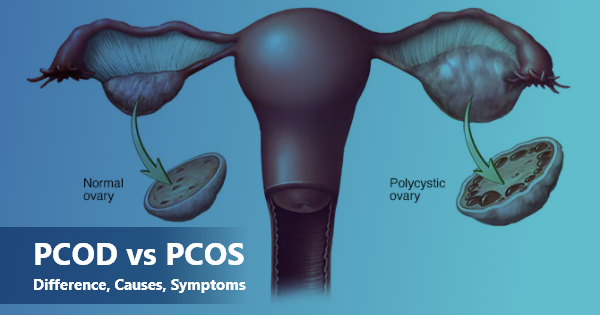Polycystic Ovarian Disease (PCOD) and Polycystic Ovary Syndrome (PCOS) are two closely related yet distinct hormonal disorders that affect a significant number of women worldwide. While they share common features, they also have important differences in terms of symptoms, causes, and potential health implications. In this article, we will delve into the intricacies of PCOD and PCOS, shedding light on their distinct characteristics.
I. Understanding PCOD and PCOS
A. What is PCOD?
Polycystic Ovarian Disease, often referred to as PCOD, is a hormonal disorder characterized by enlarged ovaries containing multiple small cysts. It primarily affects the ovaries’ ability to release mature eggs during the menstrual cycle, leading to irregular menstruation.
B. What is PCOS?
Polycystic Ovary Syndrome, or PCOS, is a broader hormonal disorder that not only involves the ovaries but also encompasses a range of systemic symptoms. In addition to ovarian cysts, PCOS is associated with metabolic and hormonal imbalances that can impact various aspects of a woman’s health.
II. Symptoms of PCOD and PCOS
A. Common Symptoms
Both PCOD and PCOS can manifest with similar symptoms, including:
1. Irregular Menstrual Cycles: Women with PCOD or PCOS may experience irregular periods, characterized by variations in cycle length and unpredictable bleeding patterns.
2. Ovulatory Dysfunction: Ovulation may be irregular or absent, leading to difficulties in conceiving.
3. Androgen Excess: Elevated levels of androgens (male hormones) can lead to symptoms such as hirsutism (excessive hair growth), acne, and male-pattern baldness.
4. Insulin Resistance: Many individuals with PCOD or PCOS experience insulin resistance, which can lead to weight gain and difficulties in maintaining a healthy weight.
5. Metabolic Disturbances: These may include high cholesterol levels, elevated blood pressure, and an increased risk of developing type 2 diabetes.
B. Specific Symptoms of PCOD
In addition to the common symptoms, PCOD may present with:
1. Enlarged Ovaries: On ultrasound imaging, the ovaries may appear enlarged and contain multiple small cysts.
2. Pelvic Pain: Some women with PCOD may experience mild to moderate pelvic discomfort.
C. Specific Symptoms of PCOS
PCOS, being a broader syndrome, can exhibit additional symptoms beyond those associated with PCOD:
1. Acne and Oily Skin: Elevated androgen levels can lead to increased oil production, resulting in acne and oily skin.
2. Mood Changes: Some women with PCOS may experience mood swings, anxiety, or depression.
3. Sleep Disruptions: Sleep apnea and other sleep disturbances are more commonly associated with PCOS.
III. Causes of PCOD and PCOS
A. PCOD
The exact cause of PCOD is not fully understood, but it is believed to result from a combination of genetic, hormonal, and environmental factors. Insulin resistance and elevated levels of androgens play a significant role in the development of PCOD.
B. PCOS
PCOS is a complex hormonal disorder with multiple contributing factors:
1. Hormonal Imbalances: Elevated levels of luteinizing hormone (LH) and insulin, along with low levels of follicle-stimulating hormone (FSH), contribute to hormonal imbalances.
2. Insulin Resistance: Insulin resistance, a condition where the body’s cells become less responsive to insulin, is a common feature of PCOS. This can lead to increased insulin production, which in turn triggers the ovaries to produce more androgens.
3. Genetic Factors: There appears to be a genetic component to PCOS, as it often runs in families.
IV. Diagnosis and Medical Management
A. Diagnosis of PCOD and PCOS
Both PCOD and PCOS are diagnosed based on a combination of medical history, physical examination, and diagnostic tests. These tests may include blood tests to measure hormone levels, ultrasound imaging to visualize the ovaries, and in some cases, additional assessments to evaluate metabolic health.
B. Medical Management
1. Lifestyle Modifications: For both PCOD and PCOS, lifestyle changes such as regular exercise, balanced nutrition, and weight management are fundamental in improving symptoms and overall well-being.
2. Hormonal Therapies: Hormonal contraceptives, such as birth control pills, are often prescribed to regulate menstrual cycles and manage symptoms related to hormone imbalances.
3. Anti-androgen Medications: These may be recommended to address symptoms like hirsutism, acne, and male-pattern baldness.
4. Insulin-Sensitizing Medications: For those with insulin resistance, medications like metformin may be prescribed to improve insulin sensitivity.
V. Fertility Considerations
A. PCOD and Fertility
While PCOD can affect fertility by disrupting ovulation, many women with PCOD can conceive with appropriate medical management and lifestyle changes.
B. PCOS and Fertility
For some women with PCOS, achieving pregnancy may be more challenging due to irregular ovulation. Fertility treatments such as ovulation induction or in vitro fertilization (IVF) may be recommended.
VI. Lifestyle and Dietary Considerations
A. Nutrition and Exercise
Balanced nutrition and regular physical activity are key components of managing both PCOD and PCOS. A well-rounded diet and exercise routine can help regulate hormones, improve insulin sensitivity, and support overall health.
B. Weight Management
Maintaining a healthy weight is particularly important for women with PCOD or PCOS, as excess weight can exacerbate hormonal imbalances and insulin resistance.
Conclusion: Navigating PCOD and PCOS
PCOD and PCOS are complex hormonal disorders that affect many women worldwide, often presenting unique challenges. Recognizing the differences between these conditions is essential for tailored medical intervention and holistic care. Through early diagnosis, medical management, and proactive lifestyle adjustments, women with PCOD or PCOS can take charge of their health and well-being.
It is important to remember that every individual’s experience with PCOD or PCOS is unique. What works for one person may not be the best approach for another. Therefore, open communication with healthcare providers and a personalized treatment plan are crucial in navigating these conditions effectively.
By embracing a comprehensive approach that includes medical care, lifestyle modifications, and emotional well-being, women can lead vibrant, fulfilling lives despite the challenges posed by PCOD or PCOS. With the right support and information, they can confidently stride forward on their health journey, empowered to live life to the fullest.





